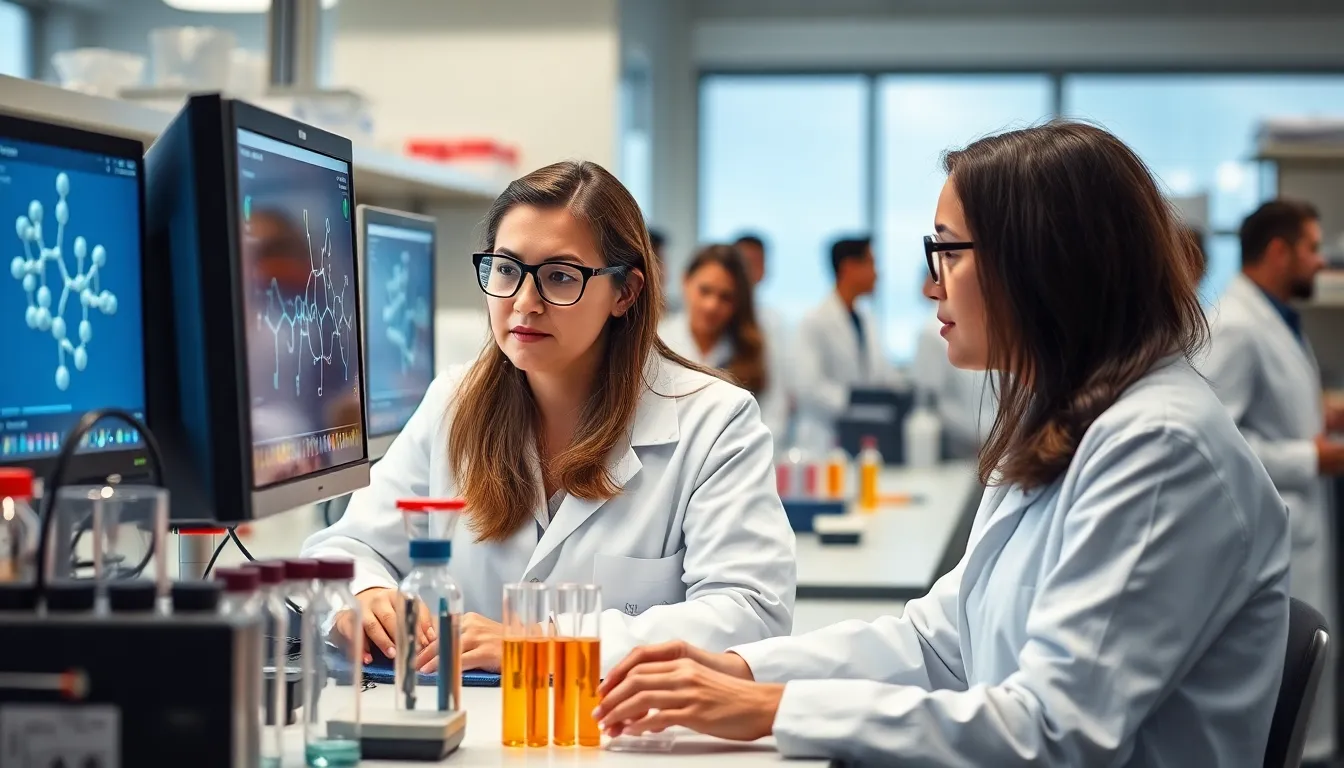Table of Contents
ToggleIn the ever-evolving world of biotechnology, peptides are the unsung heroes ready to save the day. These tiny chains of amino acids might not wear capes, but they pack a punch when it comes to health and wellness. From enhancing muscle growth to boosting skin elasticity, biotech peptides are like the Swiss Army knives of modern medicine, proving that good things really do come in small packages.
Imagine a world where a simple injection or supplement could help you feel younger, recover faster, or even tackle chronic diseases. Sounds like science fiction, right? Well, welcome to the future! As researchers unlock the secrets of these powerful compounds, the potential benefits seem limitless. So buckle up and get ready to dive into the fascinating realm of biotech peptides, where innovation meets a dash of humor and a whole lot of promise.
Overview of Biotech Peptides
Biotech peptides feature prominently in various biotechnological applications. These short chains of amino acids serve as building blocks for proteins, playing critical roles in cellular functions. Many researchers investigate their therapeutic potential, particularly in areas like cancer treatment, metabolic disorders, and neurological diseases.
Innovations in peptide synthesis have led to the development of more effective treatments. By modifying peptide structures, scientists enhance their stability and bioactivity. Therapeutic peptides, such as insulin and glucagon-like peptides, exemplify how biotech peptides can address specific health issues.
Some applications include using peptides in drugs for autoimmune diseases or in formulations for skin rejuvenation. Unique properties enable peptides to target receptors directly, providing precise actions with fewer side effects. Customized peptides can also act as biomarkers, assisting in disease diagnosis and monitoring.
Recent studies illustrate the growing importance of peptides in regenerative medicine, highlighting their role in tissue repair and growth. By managing cellular signaling pathways, peptides encourage healing and regeneration processes. This aspect of biotech peptides shows great promise for future medical treatments.
Peptides also find application in agriculture, promoting plant growth and disease resistance. Such uses reflect their versatility beyond human health, impacting food security and sustainability. As research progresses, the exploration of new peptide applications continues to expand, promising to further revolutionize various fields.
Types of Biotech Peptides

Biotech peptides can be classified into two main categories: synthetic peptides and natural peptides. Each type offers unique advantages and applications in various fields.
Synthetic Peptides
Synthetic peptides are artificially created through chemical processes. Researchers design these peptides to target specific biological functions, enhancing therapeutic efficacy. Customized sequences allow for precise interactions within biological systems. For example, pharmaceutical companies produce synthetic insulin, which helps manage diabetes effectively. These peptides often exhibit increased stability compared to their natural counterparts. Controlled conditions in laboratories enable consistent purity and dosage, crucial for clinical applications.
Natural Peptides
Natural peptides occur organically in living organisms. Produced by various cellular processes, they play essential roles in physiological functions. For instance, peptide hormones like oxytocin facilitate critical bodily processes such as childbirth and social bonding. Sources for natural peptides include animal tissues, plants, and even microorganisms. Extracting these peptides involves advanced biotechnological methods that ensure their bioactivity remains intact. Natural peptides often provide benefits with reduced side effects, making them ideal candidates for therapeutic use in medicine and wellness.
Applications of Biotech Peptides
Biotech peptides exhibit a diverse range of applications across multiple industries. Their unique properties enable significant advancements in both therapeutic and industrial contexts.
Therapeutic Uses
Therapeutic applications of biotech peptides include developing treatments for various medical conditions. Cancer therapies often incorporate peptides that selectively target tumor cells, reducing collateral damage to healthy tissue. Also, peptides play a crucial role in managing metabolic disorders; for instance, insulin peptides help regulate blood sugar levels for diabetes patients. Neurological conditions benefit from peptide-based treatments as well, such as neuroprotective peptides that aid in nerve repair. Customized peptide therapies offer precision medicine, enabling targeted interventions that minimize side effects. This innovation in treatment strategies highlights the burgeoning potential of biotech peptides within healthcare.
Industrial Applications
Industrial sectors utilize biotech peptides in numerous ways. Food production increasingly employs peptides to enhance flavor profiles and nutritional value. Peptides also serve as biocontrol agents in agriculture, promoting plant growth and providing resistance against pests and diseases. In cosmetics, peptides contribute to effective skincare products by stimulating collagen production and improving skin elasticity. Additionally, the pharmaceutical industry benefits from peptides’ role in developing vaccine candidates and diagnostic tools. As industrial applications continue to evolve, biotech peptides prove their versatility and significant impact on various facets of modern life.
Advantages of Biotech Peptides
Biotech peptides offer numerous advantages across various fields, enhancing health, agriculture, and industrial applications. Therapeutic effectiveness stands out as a primary benefit. These peptides provide targeted actions through precise molecular interactions, minimizing unwanted side effects compared to traditional treatments.
Enhanced stability marks another key advantage. Modified peptides maintain their structure and function under diverse conditions, leading to increased bioavailability. A higher bioactivity also emerges from synthetic adaptations, allowing for more effective treatment options in managing chronic diseases.
Customizability of biotech peptides allows for tailored solutions. Healthcare professionals can design specific peptides to cater to individual patient needs, resulting in personalized medicine approaches. Such customization facilitates improved outcomes for patients struggling with unique health challenges.
In agriculture, the potential benefits of biotech peptides include promoting plant growth and enhancing disease resistance. Agriculture professionals increasingly utilize these compounds to develop sustainable practices while ensuring food security. Higher nutritional value and improved flavor contribute to enhanced food production.
Regenerative medicine exploits the capabilities of biotech peptides for tissue repair and growth. This application supports the natural healing process by carefully managing cellular signaling pathways. Reduced inflammation and promotion of wound healing add to their regenerative properties.
Furthermore, the pharmaceutical industry experiences advancements through peptide applications. Vaccines incorporating peptides achieve increased immunogenicity, enhancing their effectiveness. Diagnostic tools utilizing peptides offer rapid and accurate disease identification, improving patient care.
Overall, the versatility of biotech peptides positions them as valuable assets across health, agriculture, and industry. Ongoing research continues to reveal novel applications, further underscoring their revolutionary potential.
Challenges in Biotech Peptide Development
Biotech peptide development faces several challenges that can hinder progress. Regulatory hurdles often complicate the approval processes for new peptide therapies. Developers must navigate through a maze of guidelines set by agencies such as the FDA and EMA, which can slow down innovation.
Stability poses another significant issue. Many peptides are prone to degradation, impacting shelf life and efficacy. Researchers strive to modify peptide structures to enhance their stability, but that often results in increased costs and complexity.
Manufacturing scalability presents challenges as well. Producing peptides at a larger scale while maintaining quality and consistency requires sophisticated technologies and methods. Companies frequently invest in advanced production techniques to address this concern.
Cost is a persistent obstacle too. Developing peptide drugs involves extensive research, clinical trials, and regulatory fees, leading to high overall expenses. This can limit access to promising therapies, particularly in lower-income markets.
Additionally, biological variability complicates therapeutic application. The response to peptide treatments can differ among individuals due to genetic differences, complicating outcomes. Addressing this variability requires more personalized approaches, which adds layers of complexity to treatment protocols.
Public perception also plays a role in the challenges faced. Misinformation about peptides can create skepticism, affecting both interest and funding. Education efforts are essential to clarify the potential benefits of biotech peptides in health and other sectors.
Each challenge contributes to the complexity of biotech peptide development, making it a nuanced field that requires thorough research, investment, and public understanding.
Biotech peptides are paving the way for groundbreaking advancements in various fields. Their unique properties make them invaluable in health and wellness applications. From enhancing therapeutic efficacy to promoting sustainable agricultural practices, these compounds show immense promise.
As research continues to evolve, the potential for biotech peptides to transform medicine and improve quality of life becomes increasingly evident. While challenges remain in their development and acceptance, the optimism surrounding their applications fuels ongoing exploration. The journey of biotech peptides is just beginning, and their impact on the future of health and industry is bound to be significant.




